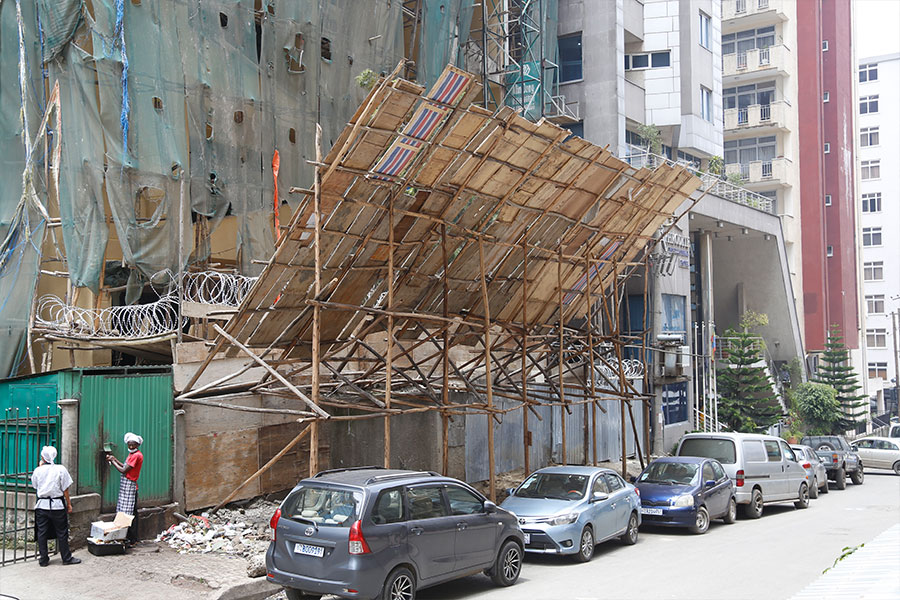
Films Review | Mar 14,2020
Sep 26 , 2021.
There are two editions of The Economist on Africa influenced by the narrative on the continent over the past two decades. Published at the turn of the century, one and rather infamous, was an all-black cover that displayed a photo of a young African carrying a bazooka superimposed over the continent. The headline read, “The Hopeless Continent.” The main theme of the issue has this opening line: “Floods in Mozambique; threats of famine in Ethiopia (again); mass murder in Uganda; the implosion of Sierra Leone; and a string of wars across the continent.”
Change some of the names of the countries, and the narrative applies today.
Ethiopia does not need reworking at all, except to show that things are even worse now. The piece did recognise that by the early to mid-1990s, things seemed to be turning for the better for Africa for once. But the civil war in Somalia, genocide in Rwanda, disaster in Sierra Leone, the war between Ethiopia and Eritrean, economic stagnation and the raging AIDS epidemic turned hope into despair.
“The next generation will be more numerous, poorer, less educated and more desperate,” The Economist projected, chillingly.
As the 2000s rolled on, it had appeared that the world`s liberal voice had its projection in vanity. Things seemed to improve. There were disasters, of course, such as the Darfur crisis in Sudan and countries such as Ethiopia utterly failed to democratise. Still, there was several good news, to which Ethiopia was a showcase.
Absolute poverty was halved, income per capita quadrupled, the AIDS epidemic subsided, and social service provisions in education and health significantly improved.
The Economist, once again, caught wind of these emerging changes. One of its editions in 2013 painted a much rosier view of Africa and the fate of its people. This time, there was no combatant on the cover page but a woman in a humming marketplace. She was depicted lifting coconuts with both her hands and displaying a wide smile. The headline read, “A Hopeful Continent.”
The content reflected optimism, though naive taken in retrospect. It described Egypt and South Sudan as “democracies of varying shades,” suggested that extremists cropping around the Sahel are being subdued and that although conflicts will likely continue to flare up, they do as such “less violently than before.”
“Most Africans no longer fear a violent or premature end," it went on to say, in complete contradiction to its 2000 edition. "[They] can hope to see their children do well.”
That was not to be. Africa, and Ethiopia, once again feels more "hopeless" than "hopeful."
West Africa is barely holding up - including Nigeria, which sees conflicts on several fronts with extremists and separatists - Central Africa never showed strong signs of progress, and East Africa looks set to fail. Countries in the Horn of Africa are repeating the 1980s, with its largest and most populous member, Ethiopia, undergoing a gruesome civil war. There is no better way of illustrating this than looking at Ethiopia’s neighbours. South Sudan has been besieged by civil war; Sudan is shattered by economic decline, political instability, and conflict flare-ups in Darfur; Eritrea is a prison state just a couple of degrees less severe than North Korea; and most of Somalia’s population has never seen a functional state. Djibouti is confronted with an uncertain future of succession, and Kenya foresees an election next year where the stakes are as high as 2007.
Strangely, the oasis of stability and normalcy is Somaliland, unrecognised by the world and left to its fate.
As callous as it may sound, it is crucial to recognise how far behind the region - and Ethiopia - is trailing and use this as momentum to carve out a different path. Pessimism of the intellect and optimism of the will are needed to build a future for the next generation of Ethiopians. Looking beyond the current civil war crisis and dysfunctional politics to get a broader picture of arising challenges will help.
The long-term outlook for Ethiopia was supposed to be challenging in any case. Falling productivity has been the biggest concern. Take the agricultural sector, where although downright famine has been avoided, food imports have nearly tripled over the past two decades as yield per land has stagnated. The hectare of land per household is plunging, leading the agricultural sector to be inadequate to support millions of youth for employment. This leads to high rates of uncontrolled urbanisation, which further dampens wages (and worsens inequality) and gives rise to urban poverty. The dislocations from the agricultural sector to urban areas, where there are not enough jobs, is why Addis Abeba has visibly high rates of commercial sex workers and homelessness on nearly every street and cranny and suffers from the associated crimes and diseases.
Add to stagnating productivity the climate change, making floods and droughts aggressive, thus devastating natural resources. All of this results in falling living standards, exasperating the current demographic explosion underway, with the country likely having to support well over 150 million people a decade later. This is a demographic trap. Countries see a fall in living standards but maintain high fertility rates, which lowers standards of living.
Ethiopians could have secured a different future had the country maintained uninterrupted double-digit growth over the next two decades. This timeline is crucial as it is a moment where the ticking bombs of population growth, rapid urbanisation, and illiberal authoritarianism's resurgence converge. The burden of war and the pandemic make them a fatal combination.
There is too much time and energy expended on cheering the combatants without realising that the fundamentals and the structural faultlines are addressed. If things continue along their current path, the next generation of Ethiopians, whatever their lingo-cultural grouping, will most certainly be “more numerous, poorer, less educated and more desperate,” just as The Economist predicated.
Past the current turmoil in civil war or societal distress due to pandemics, Ethiopians will have to confront the structural issues with generational implications.
How do Ethiopians create a social and political system that recognizes the challenges from demography, urbanization and the demand for democratic order going forward?
They can take a page out of Europeans` history eight decades ago and how they dealt with collective trauma.
In the first half of the 20th century, the Europeans nearly annihilated one another in a desperate attempt to rid themselves of the insecurities they found in one another’s nationalisms. They said, “never again.” Sure, the world is not without wars today, but they took the failures of their former leaders and used that energy to create some of the most prosperous and stable states known to humankind.
In its 175th anniversary edition, The Economist had published a manifesto on liberalism. It reflected, "society is a place of conflict and that it will and should remain so; in the right political environment, this conflict produced competition and fruitful argument."
Recognising the immutability and indispensability of conflicts in society is one important lesson to avoid the temptation for uniformity. Wars waged in the cause of "conflictless society" can be avoided but impossible to survive without subjecting the population to extreme poverty and too large a portion of it to death. Finding peaceful, legal and institutional vehicles to navigate these conflicts is where societies differ from one another. The most crucial lesson from post-second World War Europe is not about ending conflicts in society but channelling them to non-lethal and destructive platforms.
PUBLISHED ON
Sep 26,2021 [ VOL
22 , NO
1117]

Films Review | Mar 14,2020

Sunday with Eden | Mar 25,2023

Radar | Dec 19,2021

Radar | Feb 26,2022

Radar | Jul 31,2021

Fortune News | Dec 04,2021

Fortune News | Feb 26,2022

Radar | May 26,2021

View From Arada | May 29,2021

Fortune News | Aug 14,2021

Photo Gallery | 174028 Views | May 06,2019

Photo Gallery | 164253 Views | Apr 26,2019

Photo Gallery | 154356 Views | Oct 06,2021

My Opinion | 136611 Views | Aug 14,2021

Dec 22 , 2024 . By TIZITA SHEWAFERAW
Charged with transforming colossal state-owned enterprises into modern and competitiv...

Aug 18 , 2024 . By AKSAH ITALO
Although predictable Yonas Zerihun's job in the ride-hailing service is not immune to...

Jul 28 , 2024 . By TIZITA SHEWAFERAW
Unhabitual, perhaps too many, Samuel Gebreyohannes, 38, used to occasionally enjoy a couple of beers at breakfast. However, he recently swit...

Jul 13 , 2024 . By AKSAH ITALO
Investors who rely on tractors, trucks, and field vehicles for commuting, transporting commodities, and f...

Oct 12 , 2025
Tomato prices in Addis Abeba have surged to unprecedented levels, with retail stands charging between 85 Br and 140 Br a kilo, nearly triple...

Oct 12 , 2025 . By BEZAWIT HULUAGER
A sweeping change in the vehicle licensing system has tilted the scales in favour of electric vehicle (EV...

Oct 12 , 2025 . By NAHOM AYELE
A simmering dispute between the legal profession and the federal government is nearing a breaking point,...

Oct 12 , 2025 . By NAHOM AYELE
A violent storm that ripped through the flower belt of Bishoftu (Debreziet), 45Km east of the capital, in...